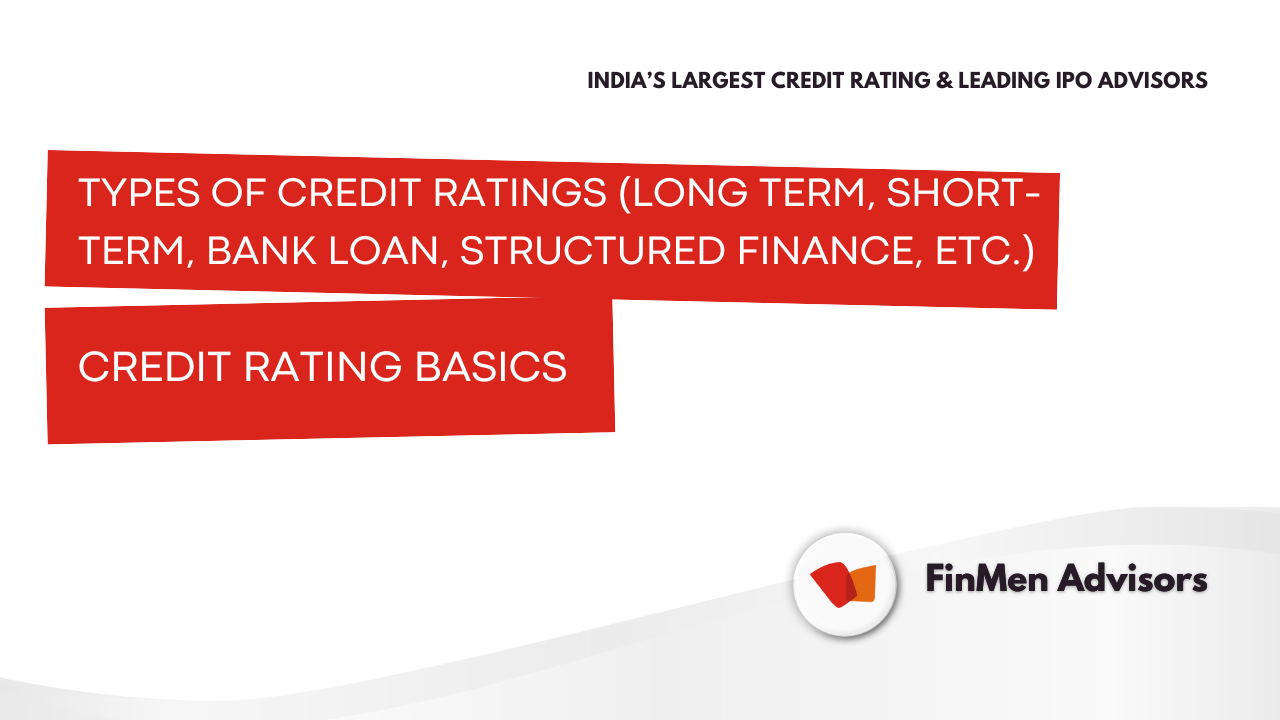Introduction
Credit ratings are not uniform — they vary depending on the type of instrument, tenure, and risk profile. Whether it’s a short-term commercial loan, a long-term bond, or a structured finance product, each requires a distinct type of rating.
FinMen Advisors, India’s Largest Credit Rating Advisory & Leading IPO Advisory firm, explains the major types of credit ratings in India and why they matter for your financing decisions.
Major Types of Credit Ratings
1. Long-Term Credit Ratings
- Apply to obligations with maturities greater than one year, such as long-term bonds, term loans, and debentures.
- Ratings usually follow scales like AAA, AA, A, BBB, BB, B, with AAA indicating the highest degree of safety.
2. Short-Term Credit Ratings
- Cover instruments with maturities of one year or less, like commercial paper (CP), certificates of deposit (CDs), and short-term borrowings.
- Common scales include A1, A2, A3, A4, etc., with A1 being the highest.
3. Bank Loan & Issuer Ratings
- Bank loan ratings assess credit risk for facilities such as working capital loans or term loans.
- Issuer ratings evaluate the overall creditworthiness of a company across all obligations, not just a single instrument.
4. Structured Finance Ratings
- Assigned to complex instruments pooling different assets, such as mortgage-backed securities (MBS), asset-backed securities (ABS), or securitization pass-through certificates (PTCs).
- Factors include the quality of underlying assets, servicing of cash flows, and the presence of credit enhancements.
5. Credit Enhancement & Structured Obligation Ratings
- Some instruments are backed by guarantees, collateral, or external support.
- Agencies use suffixes like (SO) for Structured Obligation or (CE) for Credit Enhancement, signaling improved safety due to external support.
Why Different Ratings Matter for Businesses
- Tailored financing: Each rating type applies to different borrowing needs.
- Cost of funds: A stronger rating lowers interest costs; structured finance may improve access to investors.
- Investor confidence: Different investors rely on specific ratings for decision-making.
- Regulatory compliance: Some instruments cannot be issued without appropriate ratings.
FinMen Advisors’ Role in Navigating Rating Types
As India’s leading credit rating advisory firm, FinMen Advisors helps businesses:
- Identify which rating type suits their borrowing/investment plans.
- Prepare robust documentation for rating agencies.
- Evaluate credit enhancement options for better outcomes.
- Select the right CRA and rating structure for specific instruments.
Disclaimer: FinMen Advisors provides advisory support only and does not guarantee any particular credit rating outcome.
FAQs
Q1: What is the difference between a short-term and long-term rating?
A1: Short-term ratings apply to obligations up to one year and focus on liquidity, while long-term ratings assess credit risk for obligations exceeding one year.
Q2: What does a structured obligation (SO) rating mean?
A2: It applies to instruments where repayment is supported by structures like securitization or guarantees, beyond just the issuer’s credit strength.
Q3: What is credit enhancement (CE)?
A3: CE refers to mechanisms like collateral, guarantees, or external support that improve an instrument’s safety and rating.
Q4: If my company issues bonds, which rating do I need?
A4: Bonds typically require long-term ratings, though structured or credit-enhanced bonds may also carry SO/CE ratings.
Conclusion
Understanding the different types of credit ratings is crucial for businesses looking to raise funds effectively. From short-term loans to structured finance products, each rating type has unique implications for cost, compliance, and investor trust.
FinMen Advisors, India’s Largest Credit Rating Advisory & Leading IPO Advisory firm, supports businesses in choosing the right rating path, preparing thoroughly, and presenting their case effectively to credit rating agencies.


